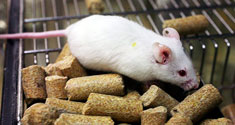Gluten-free diet reduces risk of type 1 diabetes in mice

The mouse study adds more knowledge to a field that has been object for research many years.
More than 1% of the Danish population has type 1 diabetes, one of the highest incidence rates in the world.
New experiments on mice now show a correlation between the health of the pups and their mothers eating a gluten-free diet. Our hope is that the disease may be prevented through simple dietary changes, the researchers say.
“Preliminary tests show that a gluten-free diet in humans has a positive effect on children with newly diagnosed type 1 diabetes. We therefore hope that a gluten-free diet during pregnancy and lactation may be enough to protect high-risk children from developing diabetes later in life,” says assistant professor Camilla Hartmann Friis Hansen from the Department of Veterinary Disease Biology, Faculty of Health and Medical Sciences.
The findings have recently been published in the recognised journal Diabetes.
Findings from experiments on mice are not necessarily applicable to humans, but in this case we have grounds for optimism, says co-writer on the study professor Axel Kornerup from the Department of Veterinary Disease Biology, Faculty of Health and Medical Sciences.
“Early intervention makes a lot of sense because type 1 diabetes develops early in life. We also know from existing experiments that a gluten-free diet has a beneficial effect on type 1 diabetes,” he says.
Experiments of this type have been going on since 1999, originally initiated by Professor Karsten Buschard from the Bartholin Institute at Rigshospitalet in Copenhagen, another co-writer on the study.
“This new study beautifully substantiates our research into a gluten-free diet as an effective weapon against type 1 diabetes,” Karsten Buschard explains.
The experiment showed that the diet changed the intestinal bacteria in both the mother and the pups. The intestinal flora plays an important role for the development of the immune system as well as the development of type 1 diabetes, and the study suggests that the protective effect of a gluten-free diet can be ascribed to certain intestinal bacteria. The advantage of the gluten-free diet is that the only side-effect seems to be the inconvenience of having to avoid gluten, but there is no certain evidence of the effect or side-effects.
“We have not been able to start a large-scale clinical test to either prove or disprove our hypothesis about the gluten-free diet,” says Karsten Buschard.
Assistant Professor Camilla Hartmann Friis Hansen is hoping that it will be possible to continue the work.
“If we find out how gluten or certain intestinal bacteria modify the immune system and the beta-cell physiology, this knowledge can be used to develop new treatments,” she says.
Professor Axel Kornerup Hansen
Cell: 30 66 34 86
Media Contact
All latest news from the category: Life Sciences and Chemistry
Articles and reports from the Life Sciences and chemistry area deal with applied and basic research into modern biology, chemistry and human medicine.
Valuable information can be found on a range of life sciences fields including bacteriology, biochemistry, bionics, bioinformatics, biophysics, biotechnology, genetics, geobotany, human biology, marine biology, microbiology, molecular biology, cellular biology, zoology, bioinorganic chemistry, microchemistry and environmental chemistry.
Newest articles

Webb captures top of iconic horsehead nebula in unprecedented detail
NASA’s James Webb Space Telescope has captured the sharpest infrared images to date of a zoomed-in portion of one of the most distinctive objects in our skies, the Horsehead Nebula….

Cost-effective, high-capacity, and cyclable lithium-ion battery cathodes
Charge-recharge cycling of lithium-superrich iron oxide, a cost-effective and high-capacity cathode for new-generation lithium-ion batteries, can be greatly improved by doping with readily available mineral elements. The energy capacity and…

Novel genetic plant regeneration approach
…without the application of phytohormones. Researchers develop a novel plant regeneration approach by modulating the expression of genes that control plant cell differentiation. For ages now, plants have been the…





















